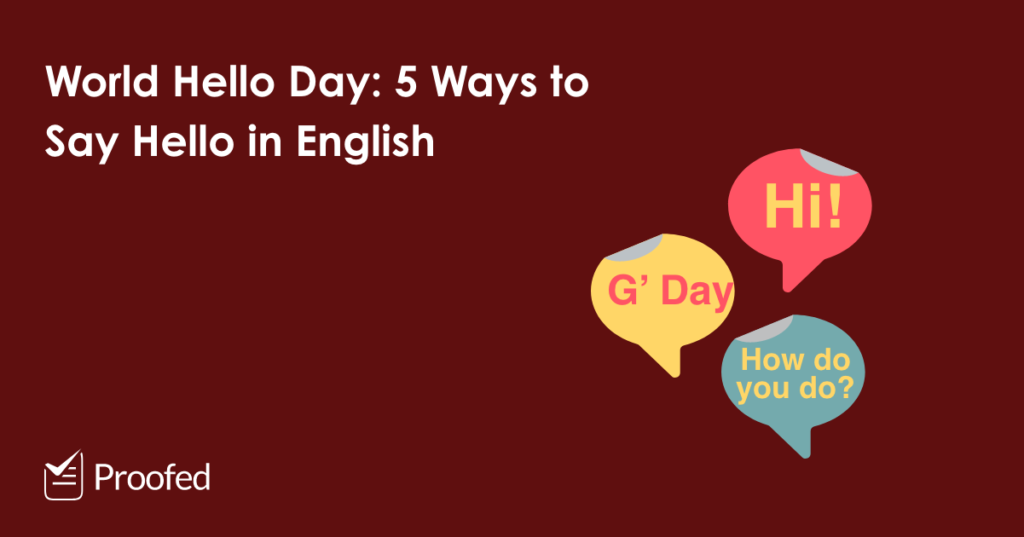Today, 21 November, is World Hello Day, which encourages us to resolve differences via communication. And all good communication starts with a greeting. But did you know that there are lots of ways to say ‘hello’ in English?
Let’s take a look at five greetings you might want to use in your writing.
1. Good Morning / Good Afternoon / Good Evening
‘Good morning’, ‘good afternoon’, and ‘good evening’ are polite greetings you can use in most situations, but the correct phrase to use depends on the time of day. The rule here is that you should:
- Use good morning between sunrise and midday.
- Use good afternoon any time after midday but before sunset.
- After sunset, use good evening.
You can also drop the word, ‘good’ for a less formal greeting:
Good morning, Joanna. How are you today?
Morning, Joanna! How are you today?
The phrase ‘good night’, meanwhile, is used to express good wishes on parting at night (like saying ‘goodbye’) or just before someone goes to bed.
2. How Do You Do?
‘How do you do?’ is now a bit old-fashioned, but it was traditionally used as a formal greeting when you met someone for the first time:
How do you do, sir? It is a pleasure to meet you!
These days, you may want to stick to something like ‘Nice to meet you.’
3. Hi
‘Hi’ started out as a way of grabbing someone’s attention, like the word ‘hey’. Over time, though, this meaning has changed and it is now mainly used as an informal way of saying ‘hello’, along with variations like ‘hiya’:
Find this useful?
Subscribe to our newsletter and get writing tips from our editors straight to your inbox.
Hi, everyone.
Hiya, John! How are you?
This is therefore a nice, simple greeting to use with friends.
4. What’s Up?
‘What’s up?’ is a very casual greeting, best known from Bugs Bunny’s catchphrase ‘What’s up, Doc?’ But it had been around since the nineteenth century, so the greeting predated the cartoon rabbit by some time.
More recently, the phrase has been shortened to ‘sup?’ and ‘wassup?’ in English slang. You may have seen this in a beer advert at some point.
5. Wotcha, Howdy and G’Day
Finally, some regional greetings from around the world:
- Wotcha – An informal greeting used in the UK, especially south and south east England. It comes from a nineteenth-century corruption of the phrase ‘What cheer?’, which sounds quite quaint by comparison.
- Howdy – A very American greeting, especially associated with southern states. Useful if you want to sound like a cowboy upon meeting people.
- G’Day – The most Australian way to greet anyone. Short for ‘good day’.
People in every part of the world have their own ways of saying ‘hello’. What are your favourite slang greetings? Let us know in the comments!
Expert Proofreading Services
If you are unsure of which greeting to use, ‘good morning’, ‘good afternoon’, and ‘good evening’ are polite options. And ‘hello’ is usually a safe bet!
However, to be sure your greetings come across as intended, why not have an expert check your writing? You can even submit a free 500-word sample document for proofreading today to find out how we work.
